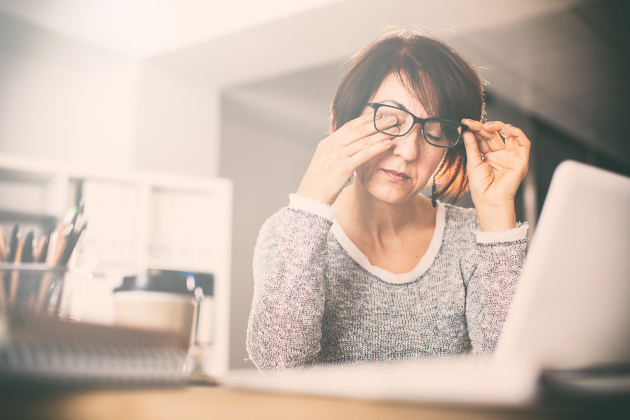While much of nursing work is centred around community and clinical settings, there are many nursing roles that are part or fully home-based and have become even more so since the pandemic.
RCN safety rep Mary Codling says the impact of COVID-19 has created an ‘always on’ culture where it’s difficult to switch from work to home life for many.
“Lots of members who are home-based due to the pandemic are telling me they don’t have any control over the amount of meetings booked into their diaries,” says Mary.
“It seems normal now to have one meeting after another on a screen, without a break. We all know we need to take regular breaks from a screen, but despite this advice, nursing staff I speak to seem to be exhausted from sitting and looking at a screen all day.”
It can be difficult to navigate all the screen meetings
There are legal requirements for employers to ensure staff are taking regular breaks and carry out risk assessments for those who are home-based. Many of the risks associated with working from home are easy to rectify – sourcing equipment or eye tests, for example. But Mary is also concerned about the mental health impact for those who are working and living in the same space.
“Some people are living in one-bedroom accommodation, maybe they are on their own and find it difficult to separate work and home as they are in the same space all the time,” says Mary.
“Because some were thrown into homeworking, it can be difficult to navigate all the screen meetings. I know from my own experience it feels very tiring and unlike meeting people in person, it can be very impersonal with a screen full of faces on mute and no one speaking.”
Legal responsibility
When signposting members for support if they are struggling working from home, reps should be mindful of the legal requirements. Employers have the same health and safety responsibilities for employees whether they are working at home or in a workplace. And like any worker, employees must take care of their own health and safety and that of others who may be harmed by their actions at work.
The RCN and Health and Safety Executive (HSE), a UK government agency responsible for the encouragement, regulation and enforcement of workplace health, safety and welfare, has practical advice for working from home and what employers must do to ensure staff are being looked after mentally and physically in their workplace.
Tips for looking after your mental wellbeing when working from home
- Stay in regular contact with your manager and colleagues.
- Talk to your manager about workload and be open about how you’re feeling.
- Take regular breaks during the day and use your annual leave.
- Set and stick to a routine – don’t revisit your computer outside your regular hours.
- Make sure you get outside if you’re able to, even if it’s just for a quick walk.
- Check your employer’s working from home policies and how to get help if you need it.
Stephen Jones, RCN Professional Lead for Mental Health, says nursing staff working from home should make sure they adhere to HSE guidance.
“The pandemic has left many feeling isolated and it’s important we all make sure we engage in social activities away from a screen,” says Stephen.
“There are many things someone can do to make sure they are separating their work and home life and therefore protecting their mental wellbeing also.”
Stephen recommends switching off phones, logging off from laptops at the end of the working day and not checking email outside work hours.
“Also, while working from home, make sure your set-up is comfortable and you have the right equipment, as sitting for hours at a screen is not a healthy way to protect your physical as well as mental wellbeing,” he adds.
Getting more help
The RCN’s newly launched unsustainable pressures web page has useful information on a variety of nursing issues exacerbated by the pandemic, including where to get help for any work issues and how to maintain your mental health while working.








